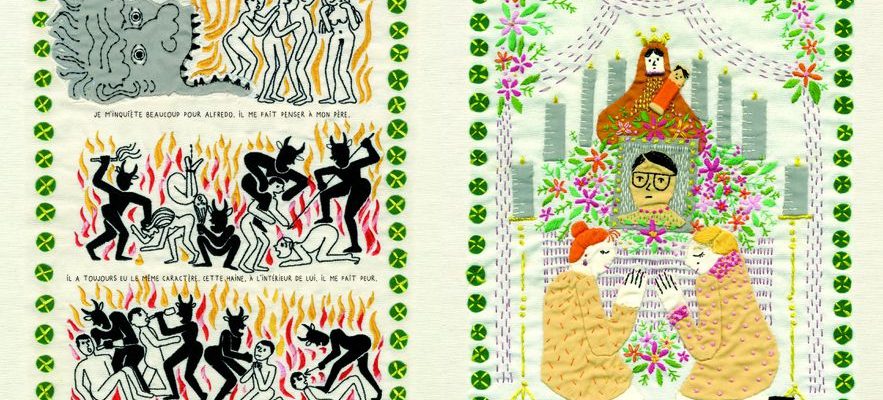We cannot say that Spain was the cradle of comics. And yet, as Léo Ferré said of the anarchists, if in the world production of comics there is not 1 Spanish author in 100, they exist… Most of them talented, who knows why. We must believe that a small, unprofitable market favors the freedom of artists. In any case, without insulting the 7,000 albums that will be released this year, these are two albums from Spain that stand out this fall for their strength and originality.
Beatriz Lema, the author Evils to say, is a ceramist by trade. She released her first album in 2017, O body of Cristo, which earned him a prize and above all a residency at the Maison des authors (Angoulême) associated with a scholarship granted by various French and Spanish institutions, all allowing him to carry out the ambitious transubstantiation of his Body of Christ in Bad things to say which appears today at Sarbacane.
Spanish embroidery and kalash
Original and surprising, I don’t think it could be more: Beatriz Lema’s album is an embroidery. With her balls of wool, her canvas, her circle and her needles, she embroidered, box by box, the story of her life. More precisely the life that his mother made him lead, who became… what? neurasthenic, delusional, mystical, suicidal… Here is one who does not hate suicide, like so many right-thinking people. The album begins with: “- Mom, wait! – Leave me. I just want to throw myself in there and get it over with.”
Without any other ambiguity than the modesty and elegance of the words, Lema explains: “She climbed on the rocks and moved away from the shore. She entered the water. She wanted to drown herself between the rocks.” Embroidery then becomes obvious: the time, the gentleness, the patience that it requires, the speech bubbles themselves are made of wool. She adds a few pencil strokes to the canvas, and colors which permeate the fabric. It’s so well printed that when you open the album you can’t help but check, with your fingertips, that it is indeed a paper album, and not a system book.
Bad things to say by Beatriz Lema
© / 2023, Editions Sarbacane
The autobiography does not scare Beatriz Lema: “I was born on January 31, 1985”. And immediately, because she also has a taste for documents, she does not hesitate to slip between two pages of embroidery the report of the psychiatrist on her patient: “Born in 1946, married, two children […] former employee in the clothing industry for a textile company.” Embroidery was not only obvious, but a necessity. The doctor diagnosed “pathological jealousy with a strong paranoid tendency”. The list of medications and their dosage follows: 20 mg of Fluoxetine, 10 mg of Olanrapine, 10 mg of Clorazepate. Everything causes emotion in the mill of details.
First memory, Beatriz was 4 years old when her father dropped her and her still “normal” mother in front of the house of an old lady, supposedly a bone-setter, who was going to perform a long and painful exorcism ceremony on the little girl. Exorcise what, we don’t know, like the child.
Everything is like that, absolutely wonderful, terrible and with infinite love for this mother on her way to madness and death. I’ll stop to talk about the other Spanish album: Heaven in the head, published by Denoël graphic. Something of Fred Deux and Hans Bellmer in the hallucinatory drawing of Sergio Garcia Sanchez. And in the story told by Antonio Altarriba, too, terror. It starts in the mines of South Kivu (Democratic Republic of Congo), where children “work”. They can only get out of there by becoming a soldier. At 10 years old, why not. When I tell you that our hero, young Nivek, must bring down his entire family to be integrated into the militia, you will have an idea of his flight across Africa to the unattainable Europe, where we are enjoying the last years of peace to read good Spanish comics.
